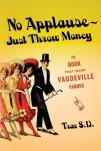
Today is the birthday of the pathbreaking Ruby Dandridge (Ruby Jean Butler, 1900-1987). Dandridge was one of the few “pushy stage mothers” of famous performing children to achieve a substantial show biz career in her own right.
The daughter of a sometime performer (and “minstrel man”) from Jamaica, Dandridge grew up in Wichita Kansas. In 1919 she married minister and cabinet maker Cyril Dandridge and the pair moved to Cleveland, Ohio where their daughters Vivian and Dorothy were born. The perpetually jobless Cyril was soon out of the picture, and Ruby began a romantic relationship with a woman named Geneva Williams, who now became the mother figure to the daughters.
With Geneva as their manager the girls began performing as “The Wonder Children” in the late 1920s. A third girl Etta Jones was added and their professional name became the Dandridge Sisters, which rapidly became an act of national stature, winning a Los Angeles radio talent show, and headlining at New York’s Cotton Club. Soon the girls were appearing in films like The Big Broadcast of 1936 and A Day at the Races (1937). The group broke up in 1940, with Dorothy going on to become the most successful, becoming the first African American woman to be nominated for a Best Actress Oscar, for her performance in Carmen Jones (1954).
Meanwhile, Ruby had launched her own career as well. She began as an extra in horror films like King Kong (1934) and Black Moon (1934). She became one of the voices of the racist Warner Bros. cartoon character Bosko in the mid 30s. Her squeaky voice served her well there and on radio shows like Amos ‘n’ Andy, The Judy Canova Show, and Beulah, and in other cartoons such as Coal Black and de Sebben Dwarfs (1943) and Goldilocks and the Jivin’ Bears (1944). Her epic size (larger by far than even Hattie McDaniel) was an asset on screen as well. You can see her in such films as Cabin in the Sky (1943), Saratoga Trunk (1945), Tap Roots (1948) and A Hole in the Head (1959), as well as the tv version of Beulah (1952-53), and one season of Father of the Bride (1961-62). The bulk of her roles were maid parts, a typical indignity for the time. She also performed in the occasional stage production and night club date.
For more on show biz history, consult No Applause, Just Throw Money: The Book That Made Vaudeville Famous, available at Amazon, Barnes and Noble, and wherever nutty books are sold.

